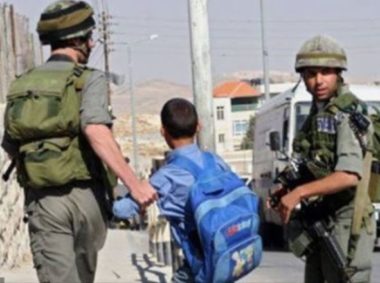RAMALLAH, Sunday, May 12, 2024 (WAFA) – Defense for Children International (DCI) has documented instances of the Israeli occupation forces using three children as human shields during their recent incursion into the Tulkarem refugee camp on May 5-6.
In a statement released today, DCI recounted the testimonies of the three children, each telling their ordeal separately.
The children described how Israeli soldiers forced them to walk ahead of them in the alleys of the camp while homes were being searched and residents instructed to leave.
In two instances, soldiers allegedly placed their rifles on the shoulders of two children and fired shots.
Thirteen-year-old Kareem, in his testimony to DCI, described how around 30 soldiers stormed his family’s apartment on the morning of May 6, detaining them in one room before forcing him to lead them through the apartment and into other rooms.
He was then taken to the fourth floor of the building along with his family and found all residents of the building held there.
Kareem recounted how soldiers took him to the staircase accompanied by a large police dog, and while walking, one soldier placed his rifle on Kareem’s shoulder and fired two shots towards an apartment door.
Kareem tearfully pleaded with the soldiers, who shouted at him to be silent.
After searching the apartments, Kareem asked the soldiers where they were taking him.
He was told in Arabic that he would accompany them and show them the way, in addition to opening doors of neighboring homes.
Upon reaching the first floor where his grandmother was unable to climb to the fourth floor due to her age and health, a verbal altercation ensued between her and the soldiers.
Kareem described being exhausted and unable to stand due to the beating and fear inflicted upon him. He remained detained with other residents until around 7 p.m. that day, during which time they were not allowed to eat.
Similar incidents unfolded with 12-year-old Mohammad, whose family decided to seek refuge in the apartment of relatives in the camp upon hearing that Israeli soldiers had stormed and surrounded the area.
Their relatives’ apartment was located on the second floor of a building.
Mohammad recounted that around 8 a.m. on Monday, May 6, Israeli soldiers barged into the apartment and ordered those inside to leave.
Despite his mother’s pleas and desperate attempts to free him from the soldiers’ grip, they forcibly separated him from his family.
“I remained alone with the soldiers after they instructed my mother and siblings to climb to the fourth floor of the building. I started crying and trembling with fear because I didn’t know what they would do to me. They were armed, masked, and their appearance was terrifying, accompanied by a large police dog making frightening noises,” Mohammad said.
He continued, “Afterward, they asked me to knock on the doors of the residential apartments in the building while they stood closely behind me, somewhat distanced. I had to ask the residents to leave. When we reached the door of one of the apartments and found it empty, the soldiers blew up the door and forced me to enter alone to inspect it. After informing them that it was empty, they entered, while I remained detained by one of the soldiers at the door of that apartment.”
The same sequence of events repeated with 14-year-old Ibrahim, who stated to that on the morning of May 6, at around 9:30 a.m., Israeli soldiers stormed his family’s home in the Tulkarem camp in a “brutal and terrifying manner,” searching and vandalizing their belongings.
He added, “A group of soldiers took me to one of the rooms and began interrogating me. When I told them I knew nothing, one of them threatened me in Arabic and said (I’ll smash you if you don’t talk). Then he physically assaulted me for several minutes before handcuffing my hands behind my back with a plastic tie. They then took me outside and asked me to walk in front of the soldiers.”
“I was trembling with fear and terror. At first, I thought they wanted to arrest me, but they asked me to walk in front of them in the alleys of the Al-Sawalme neighborhood in the camp. They would hide in the alley and ask me to show the way. After that, they released my hands, and every time we passed by a house or building, they would ask me to enter and ask the residents to leave and head towards the soldiers, after which they would raid those homes. During the raids, they would ask me to open the internal doors of the houses and apartments.”
After about two hours, the soldiers took Ibrahim to a house in the camp and detained him with the occupants until their withdrawal from the camp, he reported.

